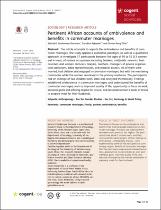| dc.contributor.author | Kumswa, Sahmicit Kankemwa | |
| dc.contributor.author | Agboola, Caroline | |
| dc.contributor.author | Kang’Ethe, Simon | |
| dc.date.accessioned | 2022-07-11T11:44:19Z | |
| dc.date.available | 2022-07-11T11:44:19Z | |
| dc.date.issued | 2022 | |
| dc.identifier.citation | Kumswa, S. K. et al. (2022). Pertinent African accounts of ambivalence and benefits in commuter marriages. Cogent Social Sciences, 8(1), 2060537. 10.1080/23311886.2022.2060537 | en_US |
| dc.identifier.issn | 2331-1886 | |
| dc.identifier.uri | https://doi.org/10.1080/23311886.2022.2060537 | |
| dc.identifier.uri | http://hdl.handle.net/10566/7582 | |
| dc.description.abstract | The article attempts to unpack the ambivalence and benefits of commuter marriages. The study applied a qualitative paradigm, as well as a qualitative
approach to investigate 17 participants between the ages of 30 to 52 (13 women
and 4 men), of various occupations including bankers, civil/public servants, businessmen and women, lecturers, lawyers, teachers, managers of private organisations politicians, sales representatives, and medical doctors. All of them were
married, had children and engaged in commuter marriages, but with the men being
commuters while the women remained in the primary residence. The participants
had an average of two children each. | en_US |
| dc.language.iso | en | en_US |
| dc.publisher | Cogent OA | en_US |
| dc.subject | Anthropology | en_US |
| dc.subject | Gender studies | en_US |
| dc.subject | Sociology & Social policy | en_US |
| dc.subject | Marriages | en_US |
| dc.subject | Africa | en_US |
| dc.title | Pertinent African accounts of ambivalence and benefits in commuter marriages | en_US |
| dc.type | Article | en_US |

